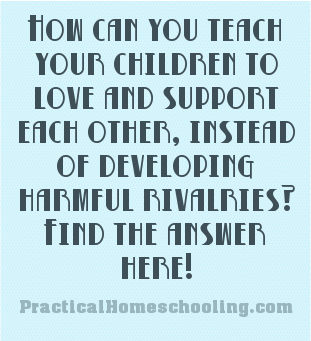 Are normal kids like TV brats? Book publishers seem to think so. I well recall the period, about 15 years ago, when it became trendy to publish books about kids' "problems." You know the kind of books I mean. I'm making up these titles, but not the type of content you can find in actual books today:
Are normal kids like TV brats? Book publishers seem to think so. I well recall the period, about 15 years ago, when it became trendy to publish books about kids' "problems." You know the kind of books I mean. I'm making up these titles, but not the type of content you can find in actual books today:
- Why I'm Mad Because I'm Having a Baby Sister
- My Parents Love the Baby More Than Me
- I Hate My Siblings, But This Book Will Teach Me How to Control the Festering Rage
I remember thinking at the time that this was not my childhood they were describing. I was the oldest of seven children, and we were thrilled every time Mom had a baby. The idea of being irked because we had to share our things with our little brothers and sisters would have been incomprehensible. Besides, as any kid knows, it takes four people for a good game of Monopoly, and a minimum of ten for a decent sandlot baseball game. So the more brothers and sisters the better, right?
How Schools Teach Rivalry
However, in one respect these books do get it right. In school, kids learn to segregate themselves by age. Older kids learn to be embarrassed about spending time with younger kids. Schoolkids also quickly learn the art of the putdown, and all about "ganging up" on the victim of the day. When all these social fighting skills - which clueless folks refer to as "socialization" - are brought home, it can take sibling rivalry to a new level of meanness. Which some people, oddly, find "cute." Hence the phenomenon of TV shows and movies using brattish behavior for laughs.
Kids Who Help Each Other
If you've been homeschooling your kids since they were born, chances are that they already get along great. I remember a gentleman who does crafts exhibitions in malls telling me, "I can always spot the homeschoolers. Instead of hurrying along or insulting their little brothers or sisters with their crafts projects, they help them and encourage them." What a great testimony!
Teamwork v. Selfishness
To those of you who have not yet arrived at this idyllic state, especially those who have just pulled your kids out of public school, I would suggest making teamwork and mutual respect your top family objectives. Everything else follows from this, believe me.
You see, brattishness, insulting, fighting, and all the rest of that nasty "sibling rivalry" stuff all come from one place: selfishness. The kids in those dreadful books who get all bent out of shape over having to share a bedroom with a sibling are... selfish. Kids who want to make themselves more popular by putting others down are... selfish. Kids who grab and cheat for what they don't deserve are... selfish.
The opposite of selfishness is teamwork. People can make amazing sacrifices for the sake of their team. Think of athletes trying to win a championship, or soldiers struggling on in the fact of impossible odds.
The problem with TV families is that they are not a team. They are a collection of individuals with no mission and no goal.
Homeschooling families are different. Right off the bat we have one very powerful goal: to give all the children an excellent education. This is a goal the children themselves can understand, believe in, and help with. Those of us who are Christians also have the goal of raising children who love the Lord, "understand the times," and want to make a difference in the world.
Team-Building Activities
But I propose we take it one step farther. Many homeschool families already instinctively get their children involved in activities that build teamwork. Sports teams, bands, Boy Scouts, Civil Air Patrol, and volunteering in a wide variety of ministries all spring to mind. And when I say "ministries" I don't mean youth ministries built around nothing but "fun" activities. Goofing around together does little to build teamwork or character; in fact, it can tear it down. The last thing any big family needs is kids who believe they are entitled to endless "fun."
You can apply the lessons learned in team-building activities outside the home to your life inside the home. For example, at their Civil Air Patrol meetings our younger kids have to obey and show respect to their older sister, who is the squadron leader. They don't obey her just because she's older, but because she has authority delegated to her by the organization. In the same way, when we put Magda in charge of an activity at home, they can now more easily understand the proper way to behave in those circumstances. Civil Air Patrol is good at teaching what proper respect looks like, and that it's not demeaning to obey someone set in authority over you, because otherwise your group's mission can't be accomplished. (To find out more about Civil Air Patrol, and how to locate and join your local squadron, go to www.gocivilairpatrol.com and CAP Customer Help)
Teach your kids to work together, to compliment each other's work, to ask for help when it's needed and to give it when asked, and you'll have a home blessed with sibling revelry, not sibling rivalry.